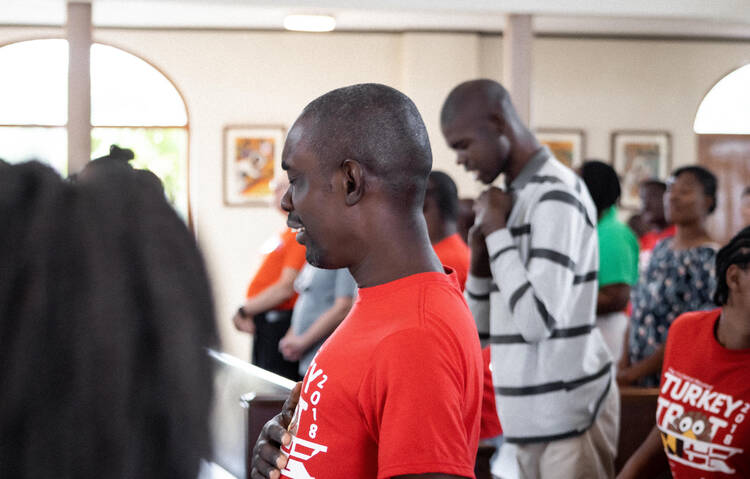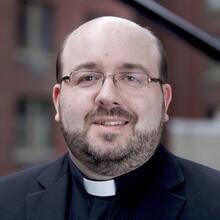“He is here” and “Thank you, Lord.” It is the second day of our visit, and we have seen these words at least 10 times already on the walls of chapels and near the entrances of other apostolates we have toured.
These phrases are painted on either side of the gate of a place named Jacob’s Ladder, about an hour outside of Kingston, Jamaica, run by a ministry called Mustard Seed Communities. The organization was founded in 1978, the same year I was born. I had encountered it briefly more than 20 years ago, during a service immersion trip to Kingston during my undergraduate years, but I am back now because of a colleague. Traug Keller, who became president of America Media at the same time as I started as editor in chief, has been involved with Mustard Seed and served on its board for years, and he invited a group of us to go to Jamaica and see its work. We made the trip at the end of January.
Mustard Seed Communities began as a response to the needs of abandoned and disabled children in Jamaica. As those children have grown, so has Mustard Seed, to continue to care for their needs and offer them a dignified place to live. It has expanded as well, to serve other needs in Jamaica and in places as far away as Zimbabwe.
Not just in slogans, but in the evident joy of a deep friendship: “He is here” and “Thank you, Lord.”
Jacob’s Ladder, which we visited on our second day in Jamaica, is built on land that used to be a bauxite mine, carpeted in the brilliant green that covers the mountains that we drove through to get there. It is not a building but a village, or actually a set of small villages: not only homes, but a community for the people who are at the heart of Mustard Seed Communities. More than one hundred people living with disabilities make their homes there, sharing the space with the staff of caregivers, cooks and farm workers who keep the place running. In addition to the small residential villages, each with seven or eight homes circling a small green, there are fields and greenhouses, providing food for Jacob’s Ladder and other Mustard Seed sites as well.
One of the women we met there came to Jacob’s Ladder when a state-run home shut down, and she has been there almost since its start 15 years ago. She shares her home with friends with whom she has been together for more than a decade. Her disability leaves her unable to walk easily, but she gestures at one of her friends, who is blind and mostly does not speak, and says, “She’s my legs. I’m her eyes.”
Not just in slogans, but in the evident joy of a deep friendship: “He is here” and “Thank you, Lord.”
Rather than delivering an answer to us, God instead invites us into the one that is being given and will not be fully complete until all things are made new.
There were more challenging sights during our visit, as well. Children at the central Mustard Seed apostolate, called My Father’s House, who lived with feeding tubes, whose limbs were twisted with cerebral palsy or heads enlarged by hydrocephalus—loved profoundly and cared for well, but whose needs will always require more intensive assistance. But there were also other joys, such as seeing a toddler who had recently learned to walk, albeit with a posture different from the norm, determined to lead her caregivers on a chase.
Any priest, and most likely anyone who has been willing to share their faith with others, has been asked about the problem of evil. Why does an all-good and all-powerful God allow suffering? How can the pain of a child be compatible with a God who loves us?
I have learned, over 18 years as a Jesuit and eight as a priest, to stop trying to answer that question with any kind of an explanation. Because it is not a question looking for a reason; the point is exactly that no reason could possibly be a justifiable answer.
But what I sometimes suggest instead—with fear and trembling, when I can say it without sounding too sure about it and it seems that hearts are vulnerable and brave enough to hear it—is that Christianity itself is God’s response to that question, not first as a doctrine but as an offering. That the life, death and resurrection of Jesus and the community of the church that is his body are what God is doing in response to evil and suffering in the world. Rather than delivering an answer to us, God instead invites us into the one that is being given and will not be fully complete until all things are made new.
“He is here” does not just mean that Christ can be found in the face of any human being and especially in those most in need, though that claim is both true and beautiful. “He is here” also means that God has chosen solidarity with humanity, both with human suffering and with human love. And that solidarity, God’s with us and ours with each other, is the shape of salvation itself.
For that, thank you, Lord.








